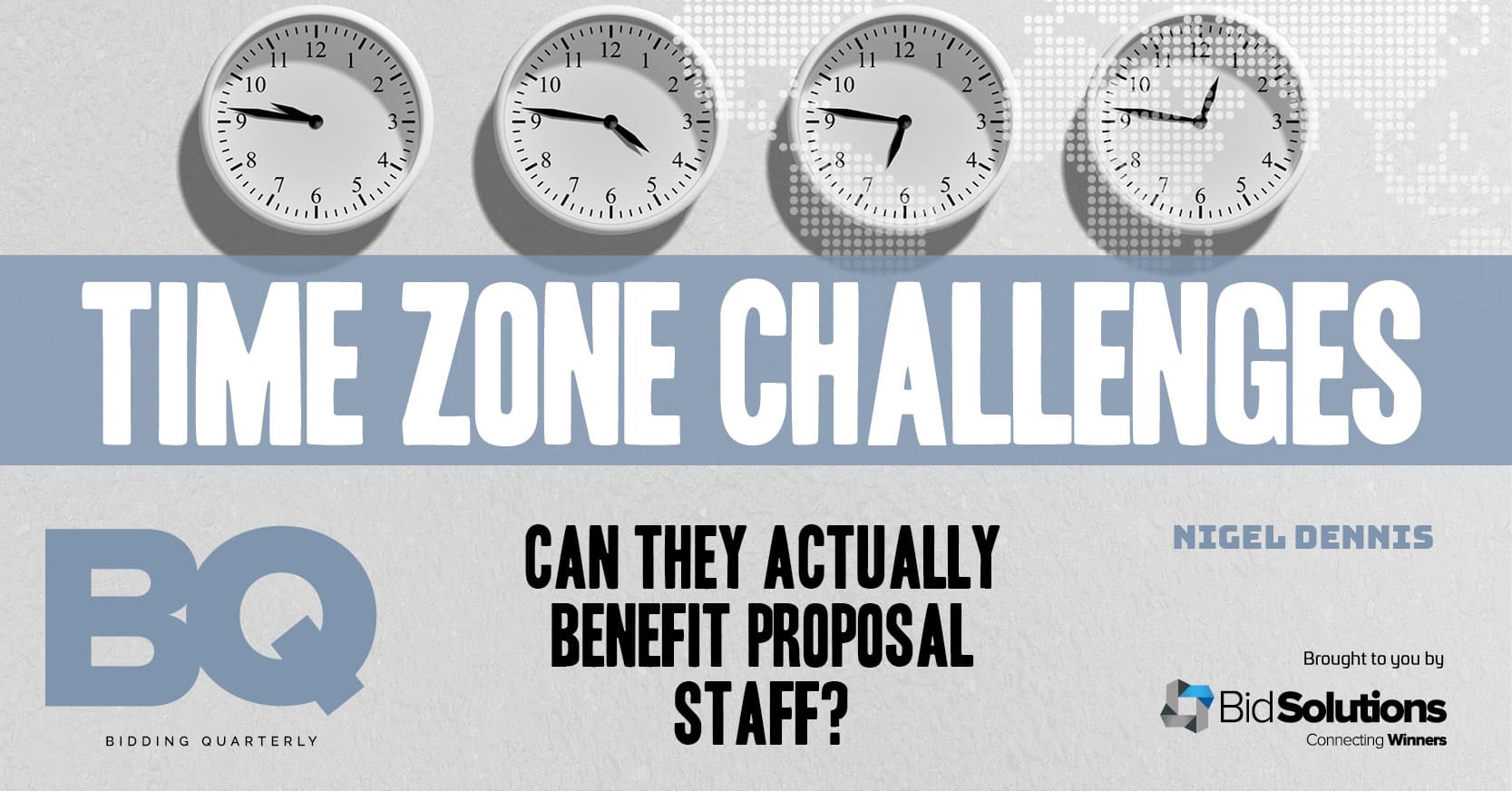Time Zone Challenges
When Martin Smith approached me to contribute to this edition of Bidding Quarterly around the theme of Father Time, we agreed to catch up – at a time that worked for both of us. Living in a vast country on the opposite side of the world, BidWrite’s internal daily operations already straddle four time zones. So navigating an 8 hour time difference to catch up between Western Australia (where I am) and the UK (where Martin is) was pretty manageable.
But when I tried to hook our New Zealand-based marketing manager into a call, suddenly the three of us catching up proved to be quite the challenge. And we were all very willing to be flexible in our days (or nights)! Little did I know it, but the bones of my contribution to this issue were staring me in the face.
What’s the Time, Mr Wolf?
As a business, ‘What’s the time there?’ is a question we grapple with daily. Like any organisation operating across multiple time zones, our own routines are well formed. However, I can pinpoint several times over the last couple of years when our staff were pressed hard, working on JV bids involving European, US or Asian-based companies partnering with Australian companies.
The significant nature of such bids makes them interesting and therefore a fantastic professional experience for our staff. But they are also challenging, not only for the complexity of content but for the practical issues that surround them.
As consultants, our tendency is to align with the rhythm set by our clients. While efficient and good for business, it can take its toll on staff. Home and professional boundaries blur, staff work against their natural preferences and sleep patterns get interrupted, impacting performance, straining relationships and raising stress.
Although our aim is to maintain regular ‘working hours’ for our staff wherever possible, as a profession we’ve long known that after-hours work is required from time to time. However, the growing internationalism of our client base and the relentless march of global business in general means that the very concept of ‘working hours’ is being increasingly challenged.
BidWrite considers itself extremely fortunate to have more than twenty hard-working professionals who are committed to their craft. They work tirelessly to help our clients achieve the amazing results they do. We want to keep it that way.
So that got me thinking… Can time zone challenges be used to benefit proposal staff?
Four Ways to Use Time Zones to Advantage Staff
Everyone is familiar with the ‘we work while you sleep’ approach to minimizing the critical path to bid completion. Instead, what follows are four practical suggestions that focus on maintaining the physical and mental wellbeing of the very people who make our business so successful and our profession so well-regarded.
1. You do the time, you take the time
As a management team, we openly acknowledge that in some circumstances time zone challenges are very disruptive. We don’t celebrate all-nighters. In fact, we actively discourage the practice. However, when time zones require significant non-standard working hours, we encourage staff to take time in lieu to maintain a healthy balance between home and work life.
2. Structure your own day
Busy bidding professionals tend to have equally busy personal lives. When time zones impact negatively, staff can flex their working days to ensure they remain refreshed and engaged with the things that matter to them outside their working environment. Yes, we have professional expectations around this, but the key to making this work is to lead with trust.
3. Share the pain
In cases where disruptive time zones can’t be worked around, we agree to share the pain with the client. This may sound counterintuitive for a profession where client centricity is so deeply ingrained. However, it reflects a true partnership, showing respect for staff and the profession. Ultimately, it results in better work.
4. You can’t beat mother nature
In his fascinating book ‘When, the Scientific Secrets of Perfect Timing’, author Dan Pink outlines the science behind owls (late risers), larks (early risers) and what he calls third birds (those somewhere in the middle). Using people’s different chronotypes can have positive implications for bid team resourcing as it makes sense not to jam square pegs into round holes. For the record, I’m an owl so I’m happy to jump onto a work call at 11pm. But call me at 6am and you might have a different experience!
A Staffing Balance that has the Right People at the Right Time
2020 was a tricky year. As leaders in our business, we saw the struggle and it crystallised the fact that looking after our people is a task never finished. Providing flexibility for staff to deal with the fallout of time zone pain was one way we could make a tangible difference.
So if, like BidWrite, you find yourself increasingly working across multiple time zones, ensure a staffing balance that allows you to deploy the right people, for the right job, at the right time – for them. Perhaps chronotypes can even be explored at the recruitment stage! I’m certain there’s plenty more we can do, but making a start is a good start.




